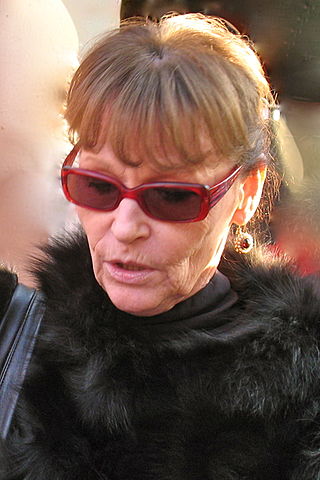Related Research Articles

Frank Paul Beyer was a German film director. In East Germany he was one of the most important film directors, working for the state film monopoly DEFA and directed films that dealt mostly with the Nazi era and contemporary East Germany. His film Trace of Stones was banned for 20 years in 1966 by the ruling SED. His 1975 film Jacob the Liar was the only East German film ever nominated for an Academy Award. After the fall of the Berlin Wall in 1989 until his death he mostly directed television films.

Ulrich Plenzdorf was a German author and dramatist.

Günther Simon was an East German actor.

Angelica Domröse is a German actress, who became famous in the role of Paula in Heiner Carow's film The Legend of Paul and Paula. Her biological father was a prisoner of war from France.
![<i>Jacob the Liar</i> (1975 film) 1974 [[East Germany]] film](https://upload.wikimedia.org/wikipedia/en/0/0d/Jacobliarposter.jpg)
Jacob the Liar is a 1975 war drama film directed by Frank Beyer, adapted by Beyer and Jurek Becker from the latter's novel of the same title. Set in Nazi-occupied Poland during the Holocaust, the film centers on Jakob Heym, a Polish Jew who attempts to raise the morale inside the ghetto by sharing encouraging rumors that he claims he has heard on an (imaginary) radio. The film was a co-production between East Germany and Czechoslovakia. It premiered on East German television on 22 December 1974, and was released theatrically on 18 April 1975.
Trace of Stones is a 1966 East German film by Frank Beyer. It was based on the eponymous novel by Erik Neutsch and starred Manfred Krug in the main role. After its release, the film was shown only for a few days, before being shelved due to conflicts with the Socialist Unity Party, the ruling communist party in the German Democratic Republic. Only after 23 years was the film shown again, in November 1989.

Erich Gustav Otto Engel was a German film and theatre director.
![<i>Naked Among Wolves</i> (1963 film) 1963 [[German Democratic Republic]] film](https://upload.wikimedia.org/wikipedia/commons/thumb/5/52/Bundesarchiv_Bild_183-B0411-0009-003%2C_Berlin%2C_Kino_Colosseum%2C_Nacht.jpg/320px-Bundesarchiv_Bild_183-B0411-0009-003%2C_Berlin%2C_Kino_Colosseum%2C_Nacht.jpg)
Naked Among Wolves is a 1963 East German film directed by Frank Beyer and starring Erwin Geschonneck and Armin Mueller-Stahl. The film is based on author Bruno Apitz's 1958 novel by the same name. The film was remade in 2015 under the direction of Philipp Kadelbach.
Carbide and Sorrel is a 1963 East German comedy film directed by Frank Beyer and starring Erwin Geschonneck.

The Adventures of Werner Holt is a 1965 East German drama film directed by Joachim Kunert.
Berlin im Aufbau is an East German documentary film directed by Kurt Maetzig, one of East Germany's most respected film-makers, between 1945 and 1946. It was a prominent 22 minute documentary, released in 1946 and produced by the DEFA film company. Maetzig was assisted in the assembly of the film by Marion Keller, who had also scripted and organized several other propaganda films of the late 1940s.

Familie Benthin is an East German film. It was released in 1950.
Story of a Young Couple is an East German film, directed by Kurt Maetzig. It was released in 1952.
Schlösser und Katen is an East German black-and-white film, directed by Kurt Maetzig. It was released in 1957.
Love's Confusion is an East German romantic comedy film directed by Slátan Dudow. It was released in 1959.
Dr. Ahrendt's Decision is an East German black-and-white film, directed by Frank Vogel. It was released in 1960.
Kein Ärger mit Cleopatra is an East German comedy film, directed by Helmut Schneider. It was released in 1960.
September Love is an East German film directed by Kurt Maetzig. It was released in 1961.
Sun Seekers is an East German film, directed by Konrad Wolf during 1958. It was banned and subsequently released only in 1972.

Ulrike Krumbiegel is a German actress. She has performed in more than 100 film and TV productions. In her early career, she performed in East German cinema and theatre. After the re-unification of Germany, her career continued with appearances in crime series such as Tatort, and the ZDF series SOKO München. She has also continued to appear in the theatre, featuring in plays by Berthold Brecht, Henrik Ibsen and William Shakespeare.
References
- ↑ Eine alte Liebe Archived 2011-07-25 at the Wayback Machine on the DEFA Foundation website.
- 1 2 Sabine Brummel. Die Werktätigen in DEFA-Spielfilmen: Propaganda in den Filmen der DDR. Diplomica Verlag (2010). ISBN 978-3-8366-9885-6. Pages 48–50.
- ↑ Axel Geiss. Zwischen Anspruch und Auftrag. Freie Universität Berlin (1997). OCLC 43472006. Page 34.
- ↑ Ralf Schenk. Regie, Frank Beyer. Hentrich (1995). ISBN 978-3-89468-156-2. Page 160.
- ↑ Eine alte Liebe on the German Film Lexicon.
- ↑ Anke Pinkert. Film and memory in East Germany. Indiana University Press (2008). ISBN 978-0-253-21967-1. Page 238.
- ↑ Joshua Feinstein. The Triumph of the Ordinary: Depictions of Daily Life in the East German Cinema, 1949–1989. ISBN 978-0-8078-5385-6. Page 58.
- ↑ Thomas Koebner. Filmregisseure: Biographien, Werkbeschreibungen, Filmographien. Reclam (1999). ISBN 978-3-15-010455-2. Page 72.
- ↑ Frank Beyer. Wenn der Wind sich Dreht. ISBN 978-3-548-60218-9. Page 192.